Maya Angelou has died at age 86, leaving behind a lasting legacy in letters and a long shadow cast over the history of hip-hop. For many rappers, Angelou was a mother figure whose poetry they tried to emulate. After hearing the news this morning, the rapper-producer Q-Tip called her one of his biggest inspirations. Later he remembered trying to copy her voice while starting out with A Tribe Called Quest:
Over the decades, each new generation of rappers has referenced Angelou’s poetry, often in reference to their shared struggles. When Nicki Minaj faced opposition as an up-and-coming female rapper, she rhymed about it in a song called “Still I Rise,” presumably after Angelou’s poem about hate directed at black women. She wasn’t the first to name a song after Angelou’s poem. On Tupac’s own “Still I Rise,” he rapped, “I was born not to make it, but I did/ The tribulations of a ghetto kid/ Still I rise.” Angelou also had an effect on Shakur in person. In an interview with George Stroumboulopoulos, Angelou remembered meeting Shakur, though she didn’t know who he was (“I don’t know six-pack,” she remembers joking at the time, in reference to 2Pac’s name), and conveying to him how important he was to the black community. According to Angelou, her message to him made him weep.
Rappers have also spoken about their struggles by referencing the title of Maya Angelou’s autobiography, I Know Why the Caged Bird Sings (which was itself named after a line from a poem by African-American poet Paul Laurence Dunbar). On the introduction to We Got It 4 Cheap, Clipse rapper Malice rhymes about trying to hustle to escape the streets, saying, “It’s like tryin’ to fly, but they clippin’ your wings/ And that’s exactly why the caged bird sings.”
Just as often, rappers have referenced Angelou as the kind of poet they aspire to be. In recent years, both Wale and Danny Brown have compared their early days to Angelou’s years as just a poet with a notebook. When artists from Digable Planets to Kanye West wanted to describe their ideal poet, they both reached for the names of Maya Angelou and Nikki Giovanni. On their debut album, The Roots compared themselves to Angelou over Shakespeare, Edgar Allan Poe, and Mark Twain. Other rappers, including both Nas and Lupe Fiasco, have, perhaps regrettably, fantasized about a mind like Angelou’s inside a model’s body, while Kanye complimented her beauty, describing “Nina Simone’s piano flow” (as sampled by West on “Get By”) as “like Michelangelo painted a portrait of Maya Angelou.”
In recent years Angelou began to tentatively embrace her status a sort of godmother to hip-hop. In 2011, she brought the voice that Q-Tip dreamed of emulating to Common’s The Dreamer, The Believer, reciting one of her poems on the album’s opening track. (She also performed the song with Common live.) She later said she was “surprised and disappointed” by Common’s use of the N-word on the track, but it didn’t turn her off such collaborations. When Kendrick Lamar needed to cast a mentor for himself on his instant classic concept album Good Kid, M.A.A.D. City, he cast Angelou. Toward the end of the album, she leads Lamar and his struggling friends in a closing prayer, declaring “the start of a new life.”
